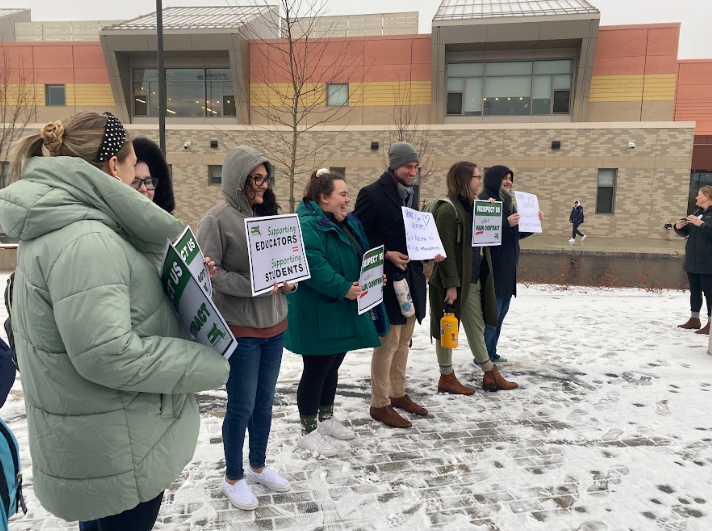All About the Teacher’s Union Contract
On Thursday January 12, a myriad of South High teachers stood outside in the cold holding signs in support of the Educational Association of Worcester (EAW), which is the Worcester teachers’ union. Their posters had slogans like, How can we put students first, if we put teachers last?, Honk for educators, and most notably Respect us with a fair contract.
The protests were abrupt and came as a surprise to many students, who wanted to know why they were happening. We decided we wanted to learn more and inform our community about these demonstrations, which impact not only the teachers, but the students as well. For the next two days, we found time to interview a plethora of teachers, wanting to make the article as well-rounded as possible, in order to give the community a full picture of what was going on.
The teachers were demonstrating as “a show of solidarity” for the EAW, which is in the midst of difficult negotiations with the Worcester Public Schools for an updated contract. The EAW, if you’re unfamiliar, is a teachers’ union. In simple terms, it is a group of educators and school staff that work to protect the rights of teachers within a school administration. They negotiate contracts that ensure transparency between educators and the district, as well as overall fair working conditions and pay. The teachers’ union not only protects teachers’ salaries but also their work environment, including the number of students they have and the number of classes they teach. When a teacher is being treated unfairly, it is the responsibility of the union to defend them and advocate for them. However, unions and their employees’ contractors (such as the school district) often have conflicting views on what should be in a contract.
This brings us to the present day. Currently, the EAW and the school district are struggling to negotiate a new contract. The current contract is from 2016. When it initially expired in 2017, it was renewed until 2020. Since then, the two groups have been attempting to create a new contract. With the knowledge that we have been given, it seems as if there has been little to no discussion between the two sides. We have been informed about silent bargaining sessions at school committee meetings, where union representatives present proposals to the school committee—however, the school committee seems not to counter, thereby inhibiting discussion.
While talking to teachers at South about the contract negotiations, a feeling of disrespect was a recurring theme. “I don’t feel that teachers are a priority, which means students aren’t a priority,” we were told. Regardless of their views towards the union, teachers feel that the lack of compromise about the negotiations also exhibits a lack of care and compassion for the educators and their work. “It’s kind of disrespectful, because it does reflect on the job we’re doing with students,” one teacher said. Another added that “we treat our students with respect… and we want to be given that from our bosses.” Many teachers have argued that a lack of respect for educators also mirrors a lack of respect for students and their needs, with one teacher mentioning “all of this affects the students the most.” The teachers are the ones who are educating and monitoring the students throughout the entirety of the school year, they told us—if the goal is to establish a thriving school system and productive environment for the students, then the teachers must also be taken care of. “Our teaching environment is our students’ learning environment,” one teacher asserted.
According to teachers interviewed, the EAW has a couple of main goals it hopes to accomplish with a new contract: more prep periods for elementary school teachers—who often receive only three preps a week, we were informed—more mental health clinicians or school adjustment counselors for students, and better pay for paraprofessionals. Paraprofessionals (including Instructional Assistants) are professionals who work with students more individually to meet their learning needs; often those students are ones with disabilities or behavioral issues. For some paraprofessionals, “working a second job and being a paraprofessional here. . . [isn’t] even enough to pay the bills.” One instructional assistant reported that they qualify for different types of financial assistance (including heating assistance), and that the increase in the amount of taxes they pay has been higher than their income raise. All the teachers interviewed believed that paraprofessionals deserve higher salaries, but they had different opinions about their own incomes and working conditions.
There seemed to be a disparity between the beliefs of younger teachers compared to senior ones. “I don’t think this is unfair working conditions,” one senior teacher said, and “I don’t think I don’t earn enough money.” Some teachers feel as though they earn a fair amount of money and do not feel mistreated or disparaged by the system. To be fair, one teacher said, “We get three months off a year; we really don’t work a full year. We get a lot of vacation,” and additionally, a teacher who had worked in another career before moving to education believed that gave them a different perspective, and helped them appreciate the profession more. Furthermore, some teachers found it was unfair to compare Worcester’s lower teaching salaries to other districts’ higher ones. While Worcester’s teachers are paid less than Boston’s, for example, some interviewees believed a majority of the difference can be explained by a higher cost of living in Boston. Still, “we never get paid what we’re worth. . . they require a lot of us.”
All teachers believed that every teacher should earn a living wage—especially when one accounts for all of the extra time and the work they put in. “I put in probably 60-70 hours a week my first year of teaching,” one teacher said. Indeed, this extra work is especially true for younger teachers, who must balance a new job in addition to earning a master’s degree in order to stay in education. It is also true that newer teachers make much less money than more senior ones—“We’re fairly compensated,” a senior teacher thought, “but the younger ones, not as much. . . Some of them have second jobs and third jobs.” This sentiment was reflected by many of our interviewees, with one teacher reporting that they received more money as a bartender over the summer, compared to the checks the school district was sending them. To compound that, newer teachers have a lack of security, easily able to lose their job within their first three years before they earn “professional status.” This all results in a stressful environment that forces teachers to balance their own wellbeing with the wellbeing of their students.
We reached out to a school committee member to hear the district’s side of the story, but for legal reasons, we were unable to have a discussion. The only information we were able to obtain about the district’s perspective was Superintendent Monarrez’s statement to Spectrum News 1. “I do think, I feel it in my bones, I firmly believe that we are going to come to an agreement that is fair, that is equitable and that meets both sides needs, that doesn’t put the district in a financial strain a few years from now,” Monarrez said. She seems committed to finding a solution, though it is unclear what that solution would be.
For the teachers, they want a solution that allows them to continue their passion for teaching students. “I teach because I love the kids… [I] teach because it’s about the kids,” one teacher emphasized. However, the school district has been losing teachers because of a lack of respect—and it seems unfair to make teachers choose what they care most about. Teachers hope a new contract would allow them to focus more on the students and their passion for teaching, worrying less about prep time, class sizes, or financial security. “We would do anything for our kids, and we’re here because we love our kids,” one teacher said. It was clear from talking to the teachers—every teacher cares exceptionally about their students and wants the best for them, believing that every student deserves equal opportunity and education, no matter what. The students, although not directly involved, are still going to be impacted by the contract negotiations—especially in the case of a strike. Although it is not considered now, it may be a future possible outcome. Even without a strike, when the union and the school district are immersed in contract negotiations, there is the possibility of leaving students behind—the very people that the system is built around. We are a large school district that faces challenges with a high number of low-income, minority, and foreign language students. We need attention and care from our school community more than ever.
Hi everyone! My name is Rania and I was born in Morooco, lived in Boston, and then moved to Worcester a few years ago. My hobbies are that I really like...

I am very happy to be the co-Editor-In-Chief of the Colonel Chronicle. I have always loved writing and connecting with my community, and journalism allows...










